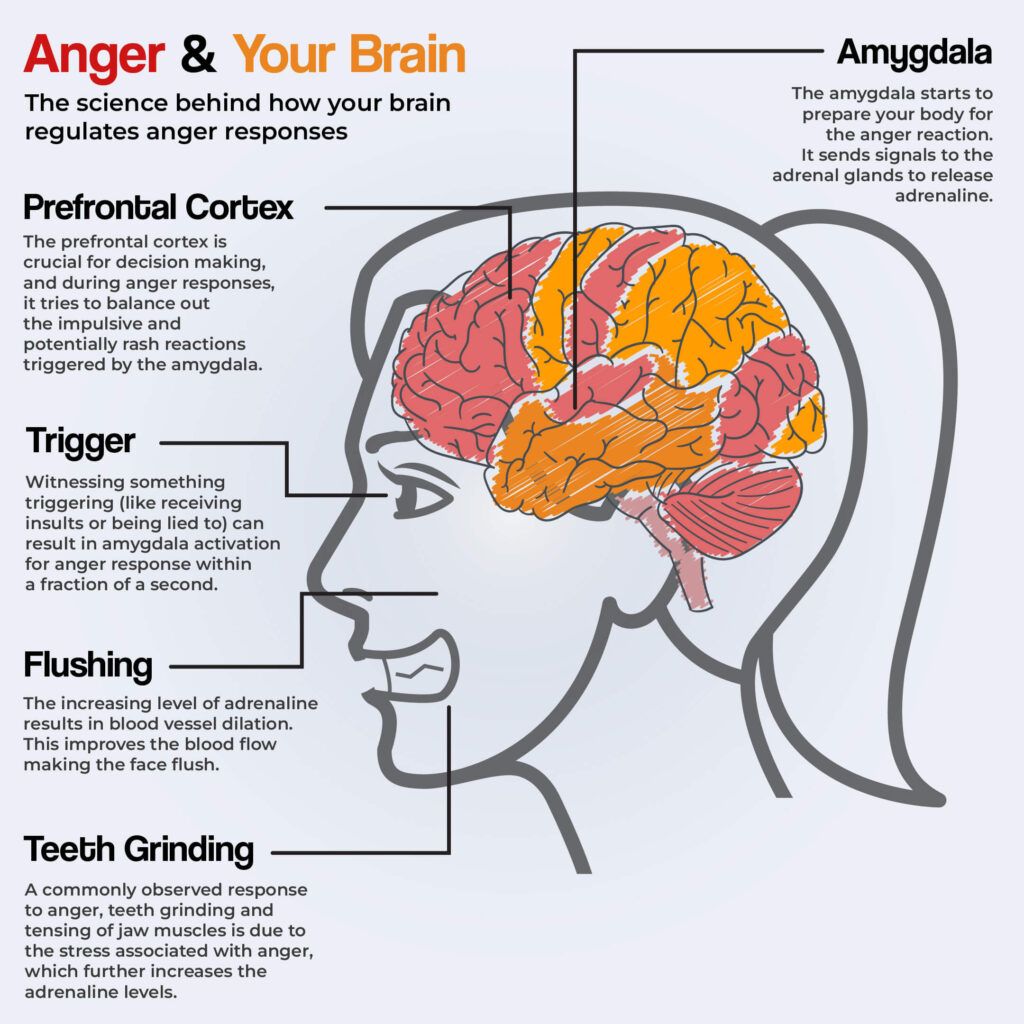Anger As An Emotion
Anger is one of the basic emotions and a natural, instinctive response to threats.
It is a part of the body’s “fight, flight or freeze” response that helps protect us from any threats or danger.
Anger is a way to express your negative feelings, and it is completely normal to feel angry at times.
It can even motivate you to solve the problem you’re facing.
A problem arises when people are not able to control their reactions and handle their anger.
Excessive anger can cause problems and even affect physical and mental health.
This can lead to anger issues that need to be managed.

Triggers of Anger
Triggers of anger vary from person to person, and each person may react differently. Common triggers include:
- Feeling attacked, threatened, or deceived
- Feeling disrespected or powerless
- Being treated unfairly
- Problems caused by people around
- Personal problems
- Pain
- Uncomfortable environment
- Grief
- Traumatic memories or incidents
How Does Anger Manifest?
Certain events or circumstances can lead you to experience anger.
Anger manifests in many ways, and you display certain signs that show your anger.
Various signs and symptoms accompany anger responses. These include:
- Increased heart rate
- Sweating
- Churning stomach
- Shaking or trembling; some people may feel like fainting
- Tension
- Pacing around
- Tightness in the chest
- Feeling anxious, nervous
- Verbal or physical responses that can be harmful in some cases
- Shouting, yelling, or crying
Are Anger Issues Genetic?
Researchers have found that anger can run in families.
Genetics influences behaviors such as anger to a certain extent. Researchers at the University of Pittsburgh found that certain genetic changes may influence anger.
The 5-HTR2A Gene
The 5-HTR2A gene contains instructions to produce the 5-HT2A receptor, which is responsible for post-synaptic serotonin signaling.
A growing number of studies suggest that the 5-HT gene system differentially regulates different types of aggression.
rs6311
rs6311 is a genetic change or a single nucleotide polymorphism (SNP) on the 5-HT2RA gene.
The GG genotype of rs6311 is associated with anger and aggression-related behavior.
Further, a Japanese team has identified an association between this SNP and impulsive reactions.
Recommendations For Anger Management
Having an angry reaction is common, but how you handle it matters. Letting your anger go out of control can lead to problems.
There are several strategies to manage your angry reaction.
- Identifying triggers: Taking note of what frustrates you (like loud honks or waiting in queue) can help you plan your day accordingly to avoid triggers.
- Cognitive restructuring: Logic defeats anger. Using cold hard logic to rationalize the situation can help you get a more balanced perspective.
- Exploring the real emotion: Sometimes, anger can mask other feelings like embarrassment, grief, vulnerability, and insecurity. In this case, working on uncovering the true feeling can be key to anger management.
- Go-to cool-down strategies: Once successful with trigger identification, dealing with anger before it gets the better of you becomes less challenging. Counting down to 10, going for short brisk walks, and taking deep breaths are some effective strategies.
Summary
- Anger is a part of the body's "fight, flight or freeze" response that helps protect us from any threats or danger. It is one of the basic emotions. Some feelings of anger from time to time are normal.
- A problem arises when people are not able to control their reactions and handle their anger. Excessive anger can cause problems and even affect physical and mental health.
- Angry reaction refers to people's frustration in response to criticism or mistreatment. Each person experiences anger differently.
- Anger manifests in many ways, characterized by various signs and symptoms, like increased heart rate and sweating.
- Researchers have found that anger can run in families and may be influenced by changes in certain genes like the serotonin gene.
- How you handle anger and react is important. Feelings of anger need to be controlled before they cross a certain level and cause anger issues. Relaxing techniques and exercising can help control anger.
References
https://www.apa.org/topics/anger
https://www.psychologytoday.com/us/basics/anger
https://www.mayoclinic.org/healthy-lifestyle/adult-health/in-depth/anger-management/art-20048149
https://www.medicalnewstoday.com/articles/326155
https://journals.plos.org/plosone/article?id=10.1371/journal.pone.0087257
https://pubmed.ncbi.nlm.nih.gov/10513148/
https://www.sciencedaily.com/releases/2007/03/070309103136.htm




